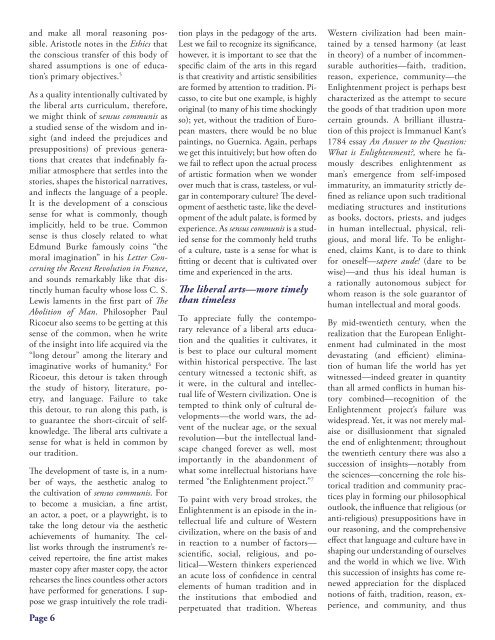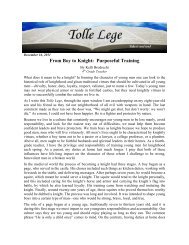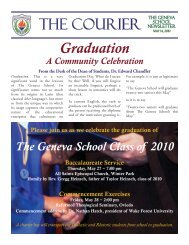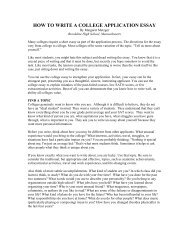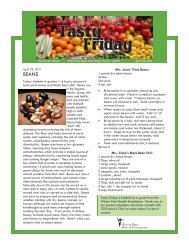April 12, 2013 - The Geneva School
April 12, 2013 - The Geneva School
April 12, 2013 - The Geneva School
You also want an ePaper? Increase the reach of your titles
YUMPU automatically turns print PDFs into web optimized ePapers that Google loves.
and make all moral reasoning possible.Aristotle notes in the Ethics thatthe conscious transfer of this body ofshared assumptions is one of education’sprimary objectives. 5As a quality intentionally cultivated bythe liberal arts curriculum, therefore,we might think of sensus communis asa studied sense of the wisdom and insight(and indeed the prejudices andpresuppositions) of previous generationsthat creates that indefinably familiaratmosphere that settles into thestories, shapes the historical narratives,and inflects the language of a people.It is the development of a conscioussense for what is commonly, thoughimplicitly, held to be true. Commonsense is thus closely related to whatEdmund Burke famously coins “themoral imagination” in his Letter Concerningthe Recent Revolution in France,and sounds remarkably like that distinctlyhuman faculty whose loss C. S.Lewis laments in the first part of <strong>The</strong>Abolition of Man. Philosopher PaulRicoeur also seems to be getting at thissense of the common, when he writeof the insight into life acquired via the“long detour” among the literary andimaginative works of humanity. 6 ForRicoeur, this detour is taken throughthe study of history, literature, poetry,and language. Failure to takethis detour, to run along this path, isto guarantee the short-circuit of selfknowledge.<strong>The</strong> liberal arts cultivate asense for what is held in common byour tradition.Page 6<strong>The</strong> development of taste is, in a numberof ways, the aesthetic analog tothe cultivation of sensus communis. Forto become a musician, a fine artist,an actor, a poet, or a playwright, is totake the long detour via the aestheticachievements of humanity. <strong>The</strong> cellistworks through the instrument’s receivedrepertoire, the fine artist makesmaster copy after master copy, the actorrehearses the lines countless other actorshave performed for generations. I supposewe grasp intuitively the role traditionplays in the pedagogy of the arts.Lest we fail to recognize its significance,however, it is important to see that thespecific claim of the arts in this regardis that creativity and artistic sensibilitiesare formed by attention to tradition. Picasso,to cite but one example, is highlyoriginal (to many of his time shockinglyso); yet, without the tradition of Europeanmasters, there would be no bluepaintings, no Guernica. Again, perhapswe get this intuitively; but how often dowe fail to reflect upon the actual processof artistic formation when we wonderover much that is crass, tasteless, or vulgarin contemporary culture? <strong>The</strong> developmentof aesthetic taste, like the developmentof the adult palate, is formed byexperience. As sensus communis is a studiedsense for the commonly held truthsof a culture, taste is a sense for what isfitting or decent that is cultivated overtime and experienced in the arts.<strong>The</strong> liberal arts—more timelythan timelessTo appreciate fully the contemporaryrelevance of a liberal arts educationand the qualities it cultivates, itis best to place our cultural momentwithin historical perspective. <strong>The</strong> lastcentury witnessed a tectonic shift, asit were, in the cultural and intellectuallife of Western civilization. One istempted to think only of cultural developments—theworld wars, the adventof the nuclear age, or the sexualrevolution—but the intellectual landscapechanged forever as well, mostimportantly in the abandonment ofwhat some intellectual historians havetermed “the Enlightenment project.” 7To paint with very broad strokes, theEnlightenment is an episode in the intellectuallife and culture of Westerncivilization, where on the basis of andin reaction to a number of factors—scientific, social, religious, and political—Westernthinkers experiencedan acute loss of confidence in centralelements of human tradition and inthe institutions that embodied andperpetuated that tradition. WhereasWestern civilization had been maintainedby a tensed harmony (at leastin theory) of a number of incommensurableauthorities—faith, tradition,reason, experience, community—theEnlightenment project is perhaps bestcharacterized as the attempt to securethe goods of that tradition upon morecertain grounds. A brilliant illustrationof this project is Immanuel Kant’s1784 essay An Answer to the Question:What is Enlightenment?, where he famouslydescribes enlightenment asman’s emergence from self-imposedimmaturity, an immaturity strictly definedas reliance upon such traditionalmediating structures and institutionsas books, doctors, priests, and judgesin human intellectual, physical, religious,and moral life. To be enlightened,claims Kant, is to dare to thinkfor oneself—sapere aude! (dare to bewise)—and thus his ideal human isa rationally autonomous subject forwhom reason is the sole guarantor ofhuman intellectual and moral goods.By mid-twentieth century, when therealization that the European Enlightenmenthad culminated in the mostdevastating (and efficient) eliminationof human life the world has yetwitnessed—indeed greater in quantitythan all armed conflicts in human historycombined—recognition of theEnlightenment project’s failure waswidespread. Yet, it was not merely malaiseor disillusionment that signaledthe end of enlightenment; throughoutthe twentieth century there was also asuccession of insights—notably fromthe sciences—concerning the role historicaltradition and community practicesplay in forming our philosophicaloutlook, the influence that religious (oranti-religious) presuppositions have inour reasoning, and the comprehensiveeffect that language and culture have inshaping our understanding of ourselvesand the world in which we live. Withthis succession of insights has come renewedappreciation for the displacednotions of faith, tradition, reason, experience,and community, and thus


